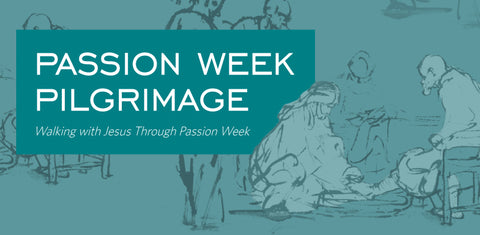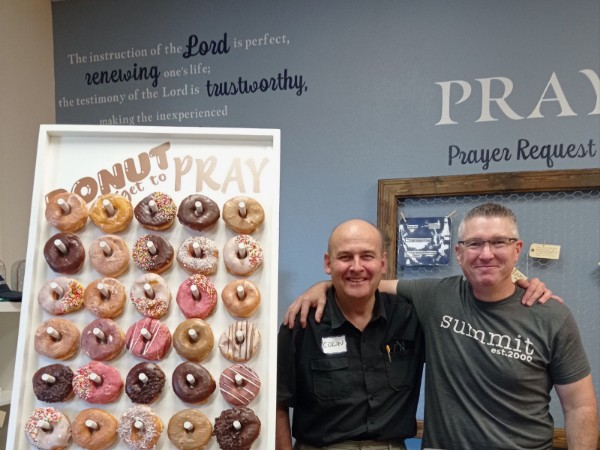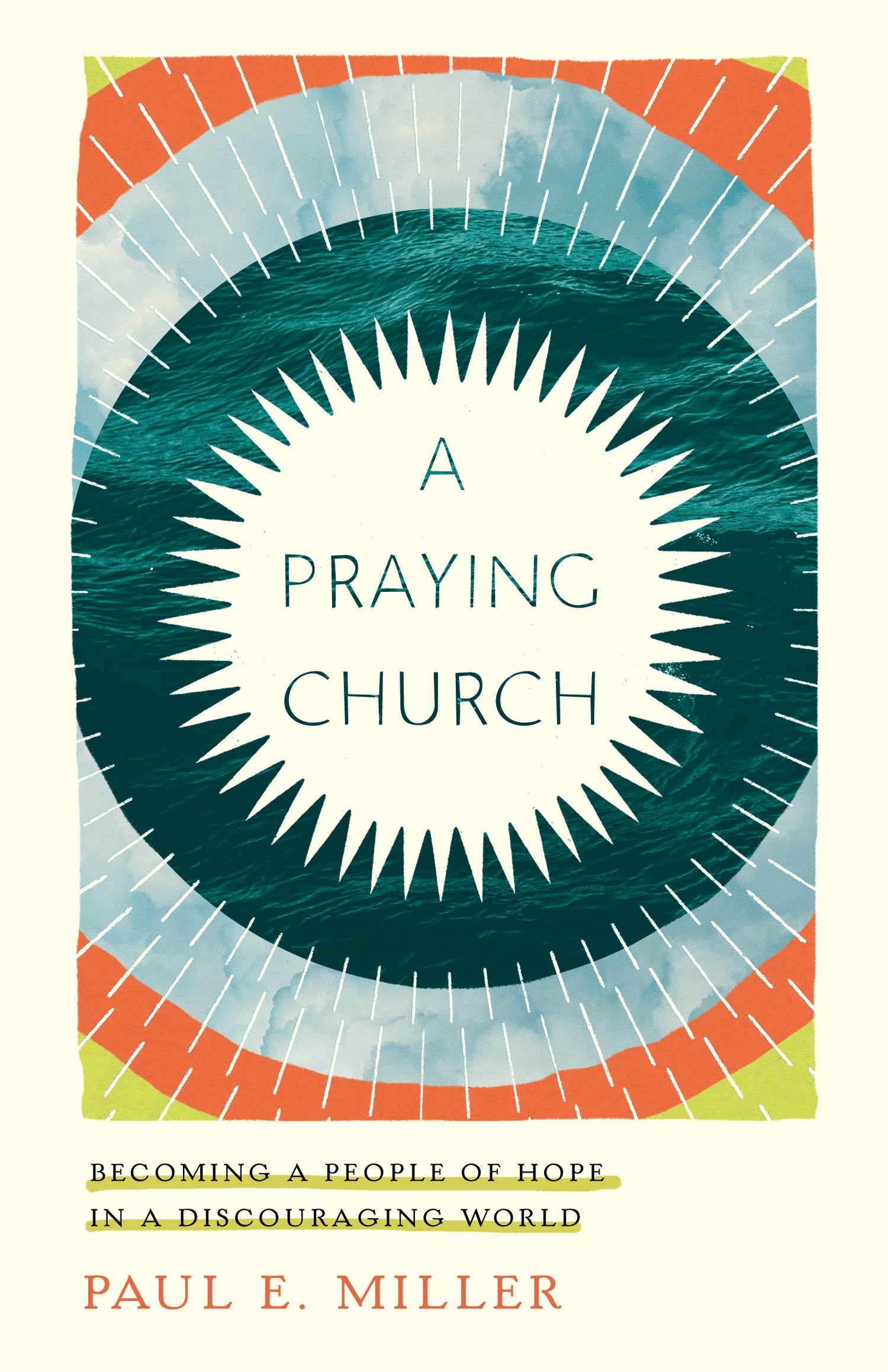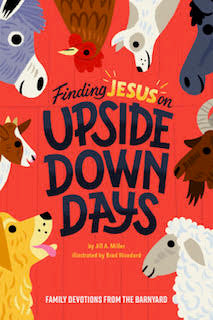Adapted from a Seeing Jesus with Paul Miller Podcast which you can listen to here.
Studying Jesus’ suffering on the way to the cross can feel heavy and dark, like one bad thing after another. But in this time of incredible pressure, his compassion, his honesty, his oneness with the Father, and his focus on others emerge with stunning clarity. If you watch closely, you’ll find that the passion showcases his beauty like nothing else.
Take, for example, the series of events that begins near the end of the Last Supper. Jesus has washed the disciples’ feet and called them to follow his example, but as he turns his attention to the coming betrayal, John tells us: “Jesus was troubled in his spirit…”
John picks this up because he is seated on Jesus’ right. If you are aware of someone, you can tell when they're anxious. It’s one of three references that John makes to Jesus’ anxiety, all of which are in relation to his passion. What I love about these references is that they normalize anxiety. Much of our modern world either tries to escape anxiety or feels guilty about feeling anxious. It's easy to see anxiety as a modern problem, and certainly there are factors in our lives and in our world that increase it. But sometimes anxiety is normal. If you love people, you are going to feel tension. We often think the mature Christian is so full of faith and confidence in God that they're sort of unshakable, unflappable. And if anybody could have walked through these circumstances and not been anxious, it would've been Jesus. But he feels anxious, anxious enough that his friend John can tell he’s troubled.
What I love about these references is that they normalize anxiety. Much of our modern world either tries to escape anxiety or feels guilty about feeling anxious.
Why is Jesus anxious? For one thing, he knows what awaits him in these next few days. He knows what Judas is about to do, and Judas has been part of his inner circle. Betrayal by a close friend is near the peak of human suffering. When we suffer from betrayal, our go-to emotion is often anger, and some anger is not inappropriate. But there’s a purity in Jesus’ response here: there's no demand for Judas to change. Jesus receives from his father what the Father has given him, sending Judas out: “What you are going to do, do quickly” (John 13:27b).
Later this same night, Jesus sees Judas again when he arrives at the garden of Gethsemane. Here, Jesus tries to reach Judas by unmasking his heart: “Judas, would you betray the son of man with a kiss?” (Luke 22:48). On the outside Judas is greeting a friend, but what’s really going on is betrayal. Most sins have a mask-like quality to them, and the mask can allow you even to lie to yourself. That’s why repentance involves comparing the outer and the inner. Jesus’ outer and his inner self are always aligned. One reason I think he loves the disciples is they pretty much say what's going on inside!
To get the feel of this scene, you have to understand that the garden would have been very dark. Olive trees have low, thick branches, and since this is spring, they’re leafed out. There are 200+ soldiers who have come with Judas. (John 18:30 uses the technical word 'cohort' which refers to 480 men.) John tells us they have lanterns and torches and weapons. They are waiting for bloodshed.
John recalls, “Then Jesus, knowing all that would happen to him, came forward and said to them, ‘Whom do you seek?’ They answered him, ‘Jesus of Nazareth.’ Jesus said to them, ‘I am he.’ Judas, who betrayed him, was standing with them. When Jesus said to them, ‘I am he,’ they drew back and fell to the ground. So he asked them again, ‘Whom do you seek?’ And they said, ‘Jesus of Nazareth.’ Jesus answered, ‘I told you that I am he. So, if you seek me, let these men go.’”
It's easy to miss the move Jesus makes here: he puts himself forward and comes out from among the olive trees. Not only is he offering his life (as he said, “No one takes my life from me. I give it.”), he's also protecting the disciples; in fact, he tells the soldiers to let them go. He knows the Jewish leaders are planning to round up not just Jesus, but the entire group of disciples. Jesus is working to care for and protect them, placing himself in harm's way for their sake.
Next, Peter whips out his sword and cuts off Malchus' ear. But Jesus diffuses this potentially volatile situation by doing two things very rapidly and publicly. First, he shuts down the disciples from defending him by loudly rebuking Peter. Second, he heals Malchus’ ear, so there is no harm for which these soldiers might extract retribution.
As the tension winds down, Jesus loves his enemies in one last way. He says to the chief priests, officers of the temple and elders that have come with Judas, “Have you come out as against a robber, with swords and clubs? When I was with you day after day in the temple, you did not lay hands on me: But this is your hour, and the power of darkness.” (Luke 22:52b-53)
He's doing with these Jewish leaders exactly what he did with Judas. On the outside, in public places, they’ve been cordial, even if sometimes questioning Jesus and trying to “trick” him. But on the inside, they want to kill him. Jesus unmasks them just as he did Judas.
The story ends with Jesus arrested. On the one hand he has completely “lost,” on the other hand – he is the one who has been in control all throughout the scene! He is like a Bruce Lee or Jason Bourne! He's just everywhere: rebuking, loving, protecting, challenging, healing, commanding. He is the prince of peace. Even at his arrest, he's probably feeling anxiety, but he's not trapped by his own emotions.
What makes the passion so beautiful is that as the camera moves to slow motion in these last days of his life, we see incident after incident where Jesus is loving like no other.
What makes the passion so beautiful is that as the camera moves to slow motion in these last days of his life, we see incident after incident where Jesus is loving like no other. He loves magnificently all the way to the very end… and beyond, as we see on Easter morning!









